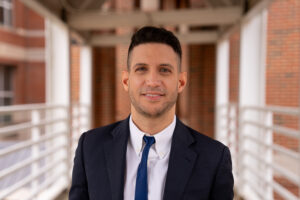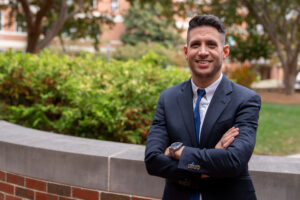News & Stories
Examining uncertainty and risk

For Professor Gill Segal, teaching finance at UNC Kenan-Flagler Business School isn’t as much about mastering numbers as it is about overcoming the psychological barriers that students can bring into the classroom or their private lives as retail investors.
“Students often find themselves intimidated by the quantitative rigor of investment classes or shaken by memories of the 2008 crash,” he says, “but finance is fundamentally about problem-solving. The kind of problem solving that all of us have to deal with, like saving for retirement.”
Segal has watched student interest in investment management change over the years, particularly after the Great Recession’s impact on the finance sector.
“There was a seismic shift post-2008. That event made some students shy away from finance careers altogether,” he says. “For others, it’s a challenge because finance isn’t always easy. But I’m here to show them that, if you’ve got the drive and curiosity, we’ll help you get the rest.”
Segal’s approach to teaching goes beyond traditional lectures. He’s crafted an advanced course that lets students engage with real-world data and work through cases they would encounter in the finance industry.
“We’re moving away from pen-and-paper calculations to data analysis, the kind you’d actually use in the field,” he says.
This hands-on approach bridges the gap between theory and practice.

“The most engaged students,” he says, “are the ones who see finance as more than formulas — they see it as a toolkit they can use to navigate the real world.”
As the lead for the Capital Markets and Investments Concentration in the Full-Time MBA Program, he teaches courses in investments, capital markets and production-based asset pricing, which links a company’s stock price to its production activities.
He also builds rewarding relationships with his PhD candidates.
“When I help a PhD candidate develop their research, it feels like a long-term collaboration, a partnership,” he says. “For me, the greatest satisfaction comes from building relationships that last beyond graduation.”
He recalls working with a former undergraduate student at UNC Kenan-Flagler who, with Segal’s support, went on to Stanford University to pursue a master’s degree in statistics and data science.
But it’s the extended journey with PhD students that leaves the biggest impression. “These are people I’ll stay connected with, hopefully for years to come. It’s incredibly fulfilling.”
Beyond his commitment to teaching, Segal’s research explores the complexities of macroeconomic uncertainty. His work feels especially timely, given heightened geopolitical tensions, rising public debt and climate-related risks today.
“I’m interested in how uncertainty affects economic growth and the stock market, but also in how these factors interact with production networks,” he says. “It’s about understanding how firms’ positions in these networks impact the way economic shocks ripple through to prices.”

His research has appeared in top journals like the Review of Financial Studies, Journal of Financial Economics and Management Science.
One focus is on supply chain uncertainty, which can have surprising consequences.
“Uncertainty is often painted with a broad brush — people just assume it’s a negative thing for growth and stock prices,” Segal notes. “But that’s not the whole story. Different types of uncertainty can have different impacts.”
For instance, one of his studies finds that “downstream uncertainty” — unpredictability coming from firms’ customers — can actually boost a company’s sales, inventory growth and overall valuation.
In contrast, “upstream uncertainty” from suppliers usually drags down these factors.
“What’s interesting here is that when faced with downstream uncertainty, companies are often more inclined to ramp up investments and expansion, banking on the potential for stronger demand ahead,” says Segal.
In addition to his research and teaching, Segal is active in UNC Kenan-Flagler’s academic community, participating in conferences, seminars and mentoring new faculty.
“Academia can feel isolating if you’re not fostering an environment of collaboration and support,” he says. “But when you’ve got a team of people who are genuinely engaged in each other’s work, productivity soars.”
This sense of community was one of the main draws for him when he joined UNC Kenan-Flagler in 2016, after receiving his PhD and MA in finance from the Wharton School at the University of Pennsylvania.
“I was thrilled to find an environment where people are curious, open and genuinely supportive,” he says. “It’s a privilege to work somewhere that values diverse perspectives.”
For Segal, being an academic is a bit like being an entrepreneur. “It’s a privilege to wake up and work on questions you find interesting, to be your own boss in terms of what you’re researching,” he says.
“I don’t mean in terms of schedule, but in terms of focus — getting to explore what truly captivates you.”
Outside of his academic pursuits, Segal has two hobbies that provide creative escape: painting and astrophotography.
“Painting started as stress relief. I’d watch videos, and it just became this calming practice for me. I’m no master, but I really enjoy it,” he says with a smile.
His other passion, astrophotography, involves capturing images of the night sky with his telescope.
“It’s a challenge, especially with young kids in the mix, but when the sky is clear, there’s nothing like it. It’s technical, but there’s also this sense of wonder that never goes away.”